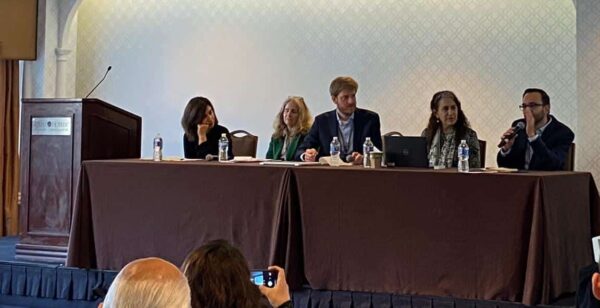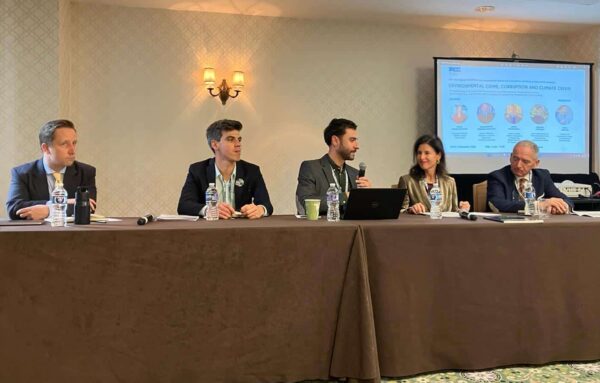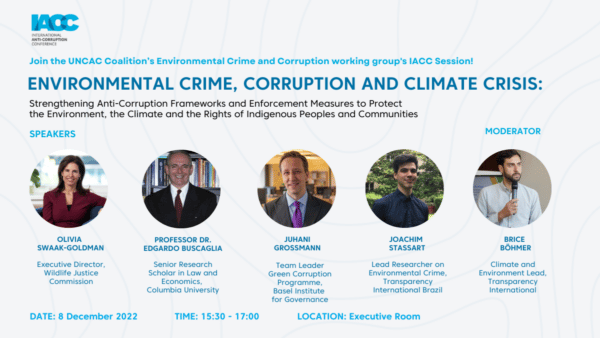Joining over 2,000 people from the international anti-corruption community, the UNCAC Coalition team were thrilled to be at the 20th International Anti-Corruption Conference in Washington D.C., USA, from 6-10 December 2022.
We co-organized two workshops, summarised below. Check out the full agenda, with many sessions featuring experts from the UNCAC Coalition, and the declaration from the conference, with more findings from across all themes and events.
Workshop 1 – Watch the recording here
Moving From Commitments to Implementation: Strengthening Anti-Corruption Monitoring Mechanisms to Increase Government Accountability
Coordinated by UNCAC Coalition and with speakers from Transparency International, Open Government Partnership and Transparencia por Colombia.
Thursday, 8 December, from 08:30 to 10:00 Washington time.

This session discussed the lessons that can be learnt from different review mechanisms of conventions and initiatives , in order to advance anti-corruption commitments implementation. The workshop gathered ideas to strengthen and improve the UNCAC review mechanism in its next phase. The 1st phase of the UNCAC mechanism is coming to an end in 2024 or 2025 and States Parties are slowly starting to discuss how the next phase should look like. This workshop identified aspects which the UNCAC Coalition can use in its advocacy on making the UNCAC review mechanism more effective.
Summary
- The UNCAC Implementation Review Mechanism is lagging behind compared to other anti-corruption review mechanisms with its low standards of transparency, participation and follow-up.
“The review mechanism is not very clear on how to engage civil society organizations… Although executive summaries (only 12-13 pages long) are published online, the full country report is not mandatorily published. There is no clear follow-up procedure in place. There is no transparency around that process. We think it is important to involve civil society at key stages of the review process.“ – Corinna Gilfillan, UNCAC Coalition
“One thing we have to take into account is that we are talking about human rights standards, access to information, civil society participation in public affairs. It’s very dangerous that the UN is agreeing to lower those standards in UNCAC reviews rather than insisting upon agreed human rights standards. One thing to be done by countries is to refer more to the fact that these are not optional standards. And we can think of whether there is a possibility for countries that agree to these standards to add their own reviews.“ – Gillian Dell, Transparency International
- The OECD Istanbul Action Plan and the Open Government Partnership’s Independent Reporting Mechanism include key aspects of transparency and civil society participation.
The following should be applied to the UNCAC Implementation Review Mechanism:
- A discussion of the draft report with governments and civil society stakeholders, giving them time to provide comment that are taken on board,
- Mandatory publication of all review documents and a press release announcing the publication,
- Including civil society parallel reports as an official part of the review process,
- Including civil society in follow-up actions.
“We need to continue promoting open mechanisms with the effective participation of civil society.” – Andrés Hernández, Transparencia por Colombia
- Civic space is shrinking. Civil society participation in anti-corruption review mechanisms should not be an afterthought or a tick-box exercise.
Including civil society in country reviews is not enough. Inclusion and participation needs to be effective to make a real impact and contribute to more effective anti-corruption efforts.
“I think in OGP we are a bit privileged. The need for civil society participation and transparency is not doubted at all.“ – Tinatin Ninua, Open Government Partnership
- We need to stop working in silos. There needs to be more meaningful engagement between civil society and governments. Governments need to speak up and defend civic space and the importance of civil society participation.
“This comes down to services delivered to people on a daily basis. I would encourage more governments to see civil society as partners.“– Tinatin Ninua, Open Government Partnership
“Any action that can be done to include civil society is essential…We need to find champions for reforms.” – Andrés Hernández, Transparencia por Colombia
- Coalitions of civil society are powerful and joint efforts can make a bigger impact. But civil society needs more core funding to be able to make meaningful contributions and effectively monitor States’ anti-corruption commitments.
“When we started monitoring these conventions in the late 90s/early 2000s, we started assessing them in a very technical way. In the past years, we have realized we need larger coalitions, more CSOs to maximize our impact.” – Andrés Hernández, Transparencia por Colombia
Recommendations
To States Parties, civil society and other stakeholders:
- Join the UNCAC Coalition in advocacy for strengthening the UNCAC Review Mechanism and its follow-up process, building on good practice approaches from other review mechanisms, to strengthen the transparency, inclusiveness and thus overall impact of the UNCAC reviews
To States Parties to the UNCAC:
- Publish information on your UNCAC focal points and review schedules;
- Publish your self-assessment checklists and full country reports for both review cycle;
- Involve civil society in the UNCAC Implementation Reviews Mechanism in a meaningful way;
- Use best practice examples and standards of transparency and civil society participation when designing the 2nd phase and follow-up mechanism for the UNCAC;
- Look at the implementation and enforcement of laws as well as legal frameworks;
- Proactively speak out in favor of higher levels of transparency and the importance of effective civil society participation in UNCAC for a and beyond.
To countries and UNCAC States Parties generally:
- Establish safe and anonymous reporting channels for whistleblowers of corruption, and make sure they as well as human rights defenders working on anti-corruption are protected;
- Disclose all information that is collected with taxpayer money in open date that is useable and reusable in a proactive manner;
- Ensure effective implementation of anti-corruption laws and policies;
- Provide civil society with enough funding to do monitoring of commitments and to hold their governments accountable;
- If you are struggling to identify independent civil society or NGOs working on anti-corruption, please approach the UNCAC Coalition at info@uncaccoalition.org – we would be happy to connect you.
The UNCAC Coalition also has a report, ‘THE WAY FORWARD: Ensuring an Inclusive, Transparent and Effective UNCAC Implementation Review Mechanism’ with recommendations on strengthening the Implementation Review Mechanism (IRM). The report examines the shortcomings of the IRM with a particular focus on how States Parties are implementing Article 13 of the Convention. At a time of global crisis and declining democratic freedom, a robust review mechanism is crucial to ensure the credibility and effectiveness of the UNCAC.
Interested? Let us know if you would like to continue to stay informed and/or be involved in future work related to this issue by completing your details in this form.
Workshop 2 – Watch the recording here
Environmental Crime, Corruption and the Climate Crisis: Strengthening Anti-Corruption Frameworks and Enforcement Measures to Protect The Environment, the Climate and the Rights of Indigenous Peoples and Communities
Coordinated by the Wildlife Justice Commission on behalf of the UNCAC Coalition’s Environmental Crime and Corruption working group, with speakers from Transparency International, Columbia University, Basel Institute for Governance and Transparency International Brazil.
Thursday, 8 December from 15:30 to 17:30 Washington time.

This workshop identified gaps in anti-corruption frameworks and weak enforcement that harm the environment, climate and human rights. The need to tackle financial aspects of transnational environmental crimes and corruption was also discussed.
Summary
- One main conclusion is the huge gap between existing legal frameworks and the application of these frameworks in practice. Weak implementation and enforcement are fuelling environmental crime and corruption and the climate crisis. More effective implementation and enforcement of laws is urgently needed to tackle this problem. This includes the application of anti-corruption and anti-money laundering laws in environmental crime cases.
- Greater international cooperation is also crucial to effectively tackling this problem. More focus is needed on promoting cooperation between all the relevant state institutions, including the judiciary, prosecutors, police, financial investigations units, customs, tax authorities, environmental protection agencies and other government bodies.
- Often environmental crime and corruption is not prioritized and the penalties for committing these crimes are not nearly commensurate with what is needed to be a deterrent. Using financial crime laws could enable the application of more severe penalties as well as the ultimate deterrent – taking the profit motive out of the crime.
- One question raised was how to promote cooperation with other UN international fora that have an important role to play in tackling this problem. What would the message be to the UN Convention on Biological Diversity COP that is taking place in Montreal? There was discussion on the need to break out of the silos to look at these issues in a holistic way and to bring all the specialists needed to tackle this problem, for example to tackle money laundering. There is also an important need to involve the private sector, including the transport sector, the financial sector and FIUs.
- Questions also brought attention to the severe risks facing whistle-blowers and environmental defenders that are coming under attack in their efforts to expose corruption and environmental crime. UN Special Rapporteur Mary Lawlor’s report on human rights defenders carrying out anti-corruption work, highlights these risks and has important recommendations for protecting whistle-blowers, human rights defenders and other actors. The point was also made that international awareness and pressure to shield whistle-blowers is also very important in helping to protect them.
- A question was posed on the links between terrorism and environmental crime and corruption and whether efforts to combat terrorism were considering this issue. The point was raised that in Latin America, 32% of cases were engaged in illegal mining, illegal logging, are engaged in acts of terrorism. The funding of those criminal networks in Latin America is going up and efforts to tackle wildlife crime may help reduce those acts of terrorism.
Recommendations
The presentations and discussion generated concrete recommendations and actions needed by governments to strengthen international efforts to prevent and combat environmental crime and corruption:
- Prioritize environmental crime and corruption: recognize environmental crime as a serious organised crime and make environmental crime a predicate offense for money laundering.
- Implement safe and accessible channels for whistle-blowers to report on corruption and environmental crime and programs to protect those who report and may face retaliation, in line with international best practice.
- Fully investigate and prosecute attacks against land and environmental defenders to hold perpetrators to account.
- Promote the effective implementation of the UNCAC to prevent and combat corruption and environmental crime. Fully utilize Article 49, on joint investigations and Article 50 on special investigative techniques.
- Promote greater international cooperation that is strongly needed to tackle the cross-border nature of environmental crime and corruption.
- Promote strong internal and external controls within government institutions to prevent environmental crime and corruption.
- Promote effective enforcement through public audits, financial investigations and asset recovery.
The UNCAC Coalition’s Environmental Crime and Corruption Working Group will draw upon these recommendations and discussions to strengthen the UN Convention Against Corruption (UNCAC) and its implementation. A concrete follow-up is to promote the development of a new UNCAC resolution at the 10th Conference of State Parties in 2023 to combat environmental crime, corruption and its impacts on the climate. A new resolution will help create more political will for governments to fully meet their UNCAC obligations and to be transparent about their implementation. In addition, the resolution can help further promote cooperation with other UN conventions and fora including the Convention on Biological Diversity and the UN Framework on Climate Change.





